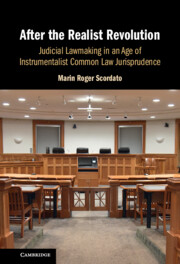 After the Realist Revolution
After the Realist Revolution Published online by Cambridge University Press: 02 May 2025
At some point, the necessary interpretation of vague, abstract, and nonspecific provisions in constitutions, including the United States Constitution, places appellate courts, including the United States Supreme Court, in a jurisprudential position very similar to the one they occupy when engaged in traditional common law analysis and lawmaking. Working out the specific doctrinal meaning of constitutional phrases such as “free speech,” “establishment of religion,” and “equal protection” is a jurisprudential task not unlike working out the specific doctrinal meaning of “duty,” “breach,” or “causation” in the common law of negligence.
This means that as a practical judicial matter, the development of constitutional law is often very similar in nature to traditional common law lawmaking. Thus, a court such as the United States Supreme Court can accurately be thought of as often operating like a common law court, despite the relative paucity of federal common law.
This chapter takes advantage of this insight to apply the nature of the paradigm shift from formalism to instrumentalism, and its many consequences, to the area of constitutional law. More specifically, it offers an example of instrumentalist common law analysis applied to the constitutional law free speech doctrine of prior restraint.
To save this book to your Kindle, first ensure [email protected] is added to your Approved Personal Document E-mail List under your Personal Document Settings on the Manage Your Content and Devices page of your Amazon account. Then enter the ‘name’ part of your Kindle email address below. Find out more about saving to your Kindle.
Note you can select to save to either the @free.kindle.com or @kindle.com variations. ‘@free.kindle.com’ emails are free but can only be saved to your device when it is connected to wi-fi. ‘@kindle.com’ emails can be delivered even when you are not connected to wi-fi, but note that service fees apply.
Find out more about the Kindle Personal Document Service.
To save content items to your account, please confirm that you agree to abide by our usage policies. If this is the first time you use this feature, you will be asked to authorise Cambridge Core to connect with your account. Find out more about saving content to Dropbox.
To save content items to your account, please confirm that you agree to abide by our usage policies. If this is the first time you use this feature, you will be asked to authorise Cambridge Core to connect with your account. Find out more about saving content to Google Drive.